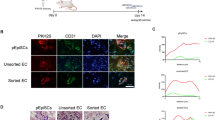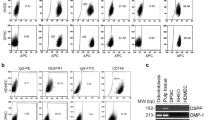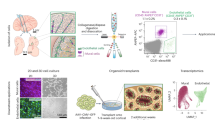Abstract
Vasculogenesis, the establishment of the vascular plexus and angiogenesis, branching of new vessels from the preexisting vasculature, involves coordinated endothelial differentiation, proliferation and migration. Disturbances in these coordinated processes may accompany diseases such as cancer. We hypothesized that the p53 family member p73, which regulates cell differentiation in several contexts, may be important in vascular development. We demonstrate that p73 deficiency perturbed vascular development in the mouse retina, decreasing vascular branching, density and stability. Furthermore, p73 deficiency could affect non endothelial cells (ECs) resulting in reduced in vivo proangiogenic milieu. Moreover, p73 functional inhibition, as well as p73 deficiency, hindered vessel sprouting, tubulogenesis and the assembly of vascular structures in mouse embryonic stem cell and induced pluripotent stem cell cultures. Therefore, p73 is necessary for EC biology and vasculogenesis and, in particular, that DNp73 regulates EC migration and tube formation capacity by regulation of expression of pro-angiogenic factors such as transforming growth factor-β and vascular endothelial growth factors. DNp73 expression is upregulated in the tumor environment, resulting in enhanced angiogenic potential of B16-F10 melanoma cells. Our results demonstrate, by the first time, that differential p73-isoform regulation is necessary for physiological vasculogenesis and angiogenesis and DNp73 overexpression becomes a positive advantage for tumor progression due to its pro-angiogenic capacity.
Similar content being viewed by others
Log in or create a free account to read this content
Gain free access to this article, as well as selected content from this journal and more on nature.com
or
Abbreviations
- EB:
-
embryoid body
- EC:
-
endothelial cells
- HUVEC:
-
human umbilical vein cells
- iPSC:
-
induced pluripotent stem cells
- mESC:
-
mouse embryonic stem cells
- p73KO:
-
p73−/−
- TGF-β:
-
transforming growth factor-β
- VEGF:
-
vascular endothelial growth factor
- WT:
-
wild type
References
Heinke J, Patterson C, Moser M . Life is a pattern: vascular assembly within the embryo. Front Biosci (Elite Ed) 2012; 4: 2269–2288.
Risau W, Flamme I . Vasculogenesis. Annu Rev Cell Dev Biol 1995; 11: 73–91.
Carmeliet P, Jain RK . Angiogenesis in cancer and other diseases. Nature 2000; 407: 249–257.
Blagosklonny MV . Apoptosis, proliferation, differentiation: in search of the order. Semin Cancer Biol 2003; 13: 97–105.
Salimath B, Marme D, Finkenzeller G . Expression of the vascular endothelial growth factor gene is inhibited by p73. Oncogene 2000; 19: 3470–3476.
Vikhanskaya F, Bani MR, Borsotti P, Ghilardi C, Ceruti R, Ghisleni G et al. p73 Overexpression increases VEGF and reduces thrombospondin-1 production: implications for tumor angiogenesis. Oncogene 2001; 20: 7293–7300.
Guan M, Peng HX, Yu B, Lu Y . p73 Overexpression and angiogenesis in human colorectal carcinoma. Jpn J Clin Oncol 2003; 33: 215–220.
Marques-Garcia F, Ferrandiz N, Fernandez-Alonso R, González-Cano L, Herreros-Villanueva M, Rosa-Garrido M et al. p73 plays a role in erythroid differentiation through GATA1 induction. J Biol Chem 2009; 284: 21139–21156.
Jost CA, Marin MC, Kaelin WG Jr . p73 is a simian [correction of human] p53-related protein that can induce apoptosis. Nature 1997; 389: 191–194.
Jung MS, Yun J, Chae HD, Kim JM, Kim SC, Choi TS et al. p53 and its homologues, p63 and p73, induce a replicative senescence through inactivation of NF-Y transcription factor. Oncogene 2001; 20: 5818–5825.
Ishimoto O, Kawahara C, Enjo K, Obinata M, Nukiwa T, Ikawa S . Possible oncogenic potential of DeltaNp73: a newly identified isoform of human p73. Cancer Res 2002; 62: 636–641.
Zaika AI, Slade N, Erster SH, Sansome C, Joseph TW, Pearl M et al. Np73, a dominant-negative inhibitor of wild-type p53 and TAp73, is up-regulated in human tumors. J Exp Med 2002; 196: 765–780.
Buhlmann S, Putzer BM . DNp73 a matter of cancer: mechanisms and clinical implications. Biochim Biophys Acta 2008; 1785: 207–216.
Yang A, Walker N, Bronson R, Kaghad M, Oosterwegel M, Bonnin J et al. p73-deficient mice have neurological, pheromonal and inflammatory defects but lack spontaneous tumours. Nature 2000; 404: 99–103.
Adamo L, Garcia-Cardena G . The vascular origin of hematopoietic cells. Dev Biol 2012; 362: 1–10.
Iacovino M, Chong D, Szatmari I, Hartweck L, Rux D, Caprioli A et al. HoxA3 is an apical regulator of haemogenic endothelium. Nat Cell Biol 2011; 13: 72–78.
Papetti M, Herman IM . Mechanisms of normal and tumor-derived angiogenesis. Am J Physiol Cell Physiol 2002; 282: C947–C970.
Ferrara N, Gerber HP, LeCouter J . The biology of VEGF and its receptors. Nat Med 2003; 9: 669–676.
Bertolino P, Deckers M, Lebrin F, ten Dijke P . Transforming growth factor-beta signal transduction in angiogenesis and vascular disorders. Chest 2005; 128: 585s–590s.
Pardali E, Goumans MJ, ten Dijke P . Signaling by members of the TGF-beta family in vascular morphogenesis and disease. Trends Cell Biol 2010; 20: 556–567.
Goumans MJ, Liu Z, ten Dijke P . TGF-beta signaling in vascular biology and dysfunction. Cell Res 2009; 19: 116–127.
Wang X, Abraham S, McKenzie JA, Jeffs N, Swire M, Tripathi VB et al. LRG1 promotes angiogenesis by modulating endothelial TGF-beta signalling. Nature 2013; 499: 306–311.
Farhang Ghahremani M, Goossens S, Haigh JJ . The p53 family and VEGF regulation: "It's complicated". Cell cycle 2013; 12: 1331–1332.
Cordenonsi M, Dupont S, Maretto S, Insinga A, Imbriano C, Piccolo S . Links between tumor suppressors: p53 is required for TGF-beta gene responses by cooperating with Smads. Cell 2003; 113: 301–314.
Jakobsson L, Kreuger J, Claesson-Welsh L . Building blood vessels—stem cell models in vascular biology. J Cell Biol 2007; 177: 751–755.
Yoshida Y, Yamanaka S . Recent stem cell advances: induced pluripotent stem cells for disease modeling and stem cell-based regeneration. Circulation 2010; 122: 80–87.
Kohler EE, Wary KK, Li F, Chatterjee I, Urao N, Toth PT et al. Flk1+ and VE-cadherin+ endothelial cells derived from iPSCs recapitulates vascular development during differentiation and display similar angiogenic potential as ESC-derived cells. PLoS One 2013; 8: e85549.
Yurugi-Kobayashi T, Itoh H, Yamashita J, Yamahara K, Hirai H, Kobayashi T et al. Effective contribution of transplanted vascular progenitor cells derived from embryonic stem cells to adult neovascularization in proper differentiation stage. Blood 2003; 101: 2675–2678.
Narazaki G, Uosaki H, Teranishi M, Okita K, Kim B, Matsuoka S et al. Directed and systematic differentiation of cardiovascular cells from mouse induced pluripotent stem cells. Circulation 2008; 118: 498–506.
Taura D, Sone M, Homma K, Oyamada N, Takahashi K, Tamura N et al. Induction and isolation of vascular cells from human induced pluripotent stem cells—brief report. Arterioscler Thromb Vasc Biol 2009; 29: 1100–1103.
Uemura A, Kusuhara S, Katsuta H, Nishikawa S . Angiogenesis in the mouse retina: a model system for experimental manipulation. Exp Cell Res 2006; 312: 676–683.
Poulaki V . Angiogenesis assays. Methods Mol Biol 2011; 731: 345–358.
Gerhardt H, Golding M, Fruttiger M, Ruhrberg C, Lundkvist A, Abramsson A et al. VEGF guides angiogenic sprouting utilizing endothelial tip cell filopodia. J Cell Biol 2003; 161: 1163–1177.
Fantin A, Vieira JM, Gestri G, Denti L, Schwarz Q, Prykhozhij S et al. Tissue macrophages act as cellular chaperones for vascular anastomosis downstream of VEGF-mediated endothelial tip cell induction. Blood 2010; 116: 829–840.
Figg W, Folkman J . Angiogenesis: An Integrative Approach from Science to Medicine. Springer: NY, USA, 2008.
Baffert F, Le T, Sennino B, Thurston G, Kuo CJ, Hu-Lowe D et al. Cellular changes in normal blood capillaries undergoing regression after inhibition of VEGF signaling. Am J Physiol Heart Circ Physiol 2006; 290: H547–H559.
Allinson KR, Lee HS, Fruttiger M, McCarty JH, Arthur HM . Endothelial expression of TGFbeta type II receptor is required to maintain vascular integrity during postnatal development of the central nervous system. PLoS One 2012; 7: e39336.
Irwin M, Marin MC, Phillips AC, Seelan RS, Smith DI, Liu W et al. Role for the p53 homologue p73 in E2F-1-induced apoptosis. Nature 2000; 407: 645–648.
Koch S, Tugues S, Li X, Gualandi L, Claesson-Welsh L . Signal transduction by vascular endothelial growth factor receptors. Biochem J 2011; 437: 169–183.
Puceat M . TGFbeta in the differentiation of embryonic stem cells. Cardiovasc Res 2007; 74: 256–261.
Wong MK, Gotlieb AI . In vitro reendothelialization of a single-cell wound. Role of microfilament bundles in rapid lamellipodia-mediated wound closure. Lab Invest 1984; 51: 75–81.
Abedi H, Zachary I . Vascular endothelial growth factor stimulates tyrosine phosphorylation and recruitment to new focal adhesions of focal adhesion kinase and paxillin in endothelial cells. J Biol Chem 1997; 272: 15442–15451.
Fernandez-Garcia B, Vaque JP, Herreros-Villanueva M, Marques-Garcia F, Castrillo F, Fernandez-Medarde A et al. p73 cooperates with Ras in the activation of MAP kinase signaling cascade. Cell Death Differ 2007; 14: 254–265.
Fidler IJ, Nicolson GL . Organ selectivity for implantation survival and growth of B16 melanoma variant tumor lines. J Natl Cancer Inst 1976; 57: 1199–1202.
Hlatky L, Hahnfeldt P, Folkman J, Li Y, Berthiaume F, Toner M . Clinical application of antiangiogenic therapy: microvessel density, what it does and doesn't tell us. J Natl Cancer Inst 2002; 94: 883–893.
Park J, Cho CH, Parashurama N, Li Y, Berthiaume F, Toner M et al. Microfabrication-based modulation of embryonic stem cell differentiation. Lab Chip 2007; 7: 1018–1028.
Bautch VL, Redick SD, Scalia A, Harmaty M, Carmeliet P, Rapoport R . Characterization of the vasculogenic block in the absence of vascular endothelial growth factor-A. Blood 2000; 95: 1979–1987.
Ng YS, Ramsauer M, Loureiro RM, D'Amore PA . Identification of genes involved in VEGF-mediated vascular morphogenesis using embryonic stem cell-derived cystic embryoid bodies. Lab Invest 2004; 84: 1209–1218.
Hidaka M, Stanford WL, Bernstein A . Conditional requirement for the Flk-1 receptor in the in vitro generation of early hematopoietic cells. Proc Natl Acad Sci USA 1999; 96: 7370–7375.
Jakobsson L, Kreuger J, Holmborn K, Lundin L, Eriksson I, Kjellén L et al. Heparan sulfate in trans potentiates VEGFR-mediated angiogenesis. Dev Cell 2006; 10: 625–634.
Vittet D, Buchou T, Schweitzer A, Dejana E, Huber P . Targeted null-mutation in the vascular endothelial-cadherin gene impairs the organization of vascular-like structures in embryoid bodies. Proc Natl Acad Sci USA 1997; 94: 6273–6278.
Bid HK, Roberts RD, Cam M, Audino A, Kurmasheva RT, Lin J et al. DeltaNp63 promotes pediatric neuroblastoma and osteosarcoma by regulating tumor angiogenesis. Cancer Res 2014; 74: 320–329.
Pardali E, Ten Dijke P . TGFbeta signaling and cardiovascular diseases. Int J Biol Sci 2012; 8: 195–213.
Holderfield MT, Hughes CC . Crosstalk between vascular endothelial growth factor, notch, and transforming growth factor-beta in vascular morphogenesis. Circ Res 2008; 102: 637–652.
Steder M, Alla V, Meier C, Spitschak A, Pahnke J, Fürst K et al. DNp73 exerts function in metastasis initiation by disconnecting the inhibitory role of EPLIN on IGF1R-AKT/STAT3 signaling. Cancer Cell 2013; 24: 512–527.
Alexandrova EM, Moll UM . Role of p53 family members p73 and p63 in human hematological malignancies. Leukemia & lymphoma 2012; 53: 2116–2129.
Flores ER, Sengupta S, Miller JB, Newman JJ, Bronson R, Crowley D et al. Tumor predisposition in mice mutant for p63 and p73: evidence for broader tumor suppressor functions for the p53 family. Cancer Cell 2005; 7: 363–373.
Woltjen K, Michael IP, Mohseni P, Desai R, Mileikovsky M, Hämäläinen R et al. piggyBac transposition reprograms fibroblasts to induced pluripotent stem cells. Nature 2009; 458: 766–770.
Li X, Claesson‐Welsh L, Shibuya M . Chapter 13 VEGF receptor signal transduction. Methods Enzymol 2008; 443: 261–284.
Magnusson P, Rolny C, Jakobsson L, Wikner C, Wu Y, Hicklin DJ et al. Deregulation of Flk-1/vascular endothelial growth factor receptor-2 in fibroblast growth factor receptor-1-deficient vascular stem cell development. J Cell Sci 2004; 117: 1513–1523.
Tomasini R, Tsuchihara K, Wilhelm M, Fujitani M, Rufini A, Cheung CC et al. TAp73 knockout shows genomic instability with infertility and tumor suppressor functions. Genes Dev 2008; 22: 2677–2691.
Kudryashova E, Wu J, Havton LA, Spencer MJ . Deficiency of the E3 ubiquitin ligase TRIM32 in mice leads to a myopathy with a neurogenic component. Hum Mol Genet 2009; 18: 1353–1367.
Acknowledgements
This work was supported by Grants SAF2012-36143 from Spanish Ministerio de Economía y Competitividad and cofinanced by FEDER funds (to MCM), and Grant LE015A10-2 from the Junta de Castilla y Leon (to MCM). RF-A was holder of a predoctoral scholarship from the Spanish Ministry of Science and Education (AP2007-02022). MM-L is a holder of a predoctoral scholarship from Junta de Castilla y Leon (PIRTU 2010). Work in the LCW lab was supported by Grants from the Swedish Cancer Foundation and Swedish Science Council. We thank the Instituto Biomar SA (Leon, Spain) for kindly supplying HUVEC and B16-F10 cells. We also thank the Pathology Deparment at the Complejo Hospitalario de Leon (Leon, Spain) for technical help and assistance in tumor analysis.
Author information
Authors and Affiliations
Corresponding author
Ethics declarations
Competing interests
The authors declare no conflict of interest.
Additional information
Edited by E Candi
Supplementary Information accompanies this paper on Cell Death and Differentiation website
Rights and permissions
About this article
Cite this article
Fernandez-Alonso, R., Martin-Lopez, M., Gonzalez-Cano, L. et al. p73 is required for endothelial cell differentiation, migration and the formation of vascular networks regulating VEGF and TGFβ signaling. Cell Death Differ 22, 1287–1299 (2015). https://doi.org/10.1038/cdd.2014.214
Received:
Revised:
Accepted:
Published:
Issue date:
DOI: https://doi.org/10.1038/cdd.2014.214
This article is cited by
-
p73 isoforms meet evolution of metastasis
Cancer and Metastasis Reviews (2022)
-
p73 is required for vessel integrity controlling endothelial junctional dynamics through Angiomotin
Cellular and Molecular Life Sciences (2022)
-
Transplanted embryonic retinal stem cells have the potential to repair the injured retina in mice
BMC Ophthalmology (2021)
-
The p53 family member p73 in the regulation of cell stress response
Biology Direct (2021)
-
The hypoxic tumour microenvironment
Oncogenesis (2018)



